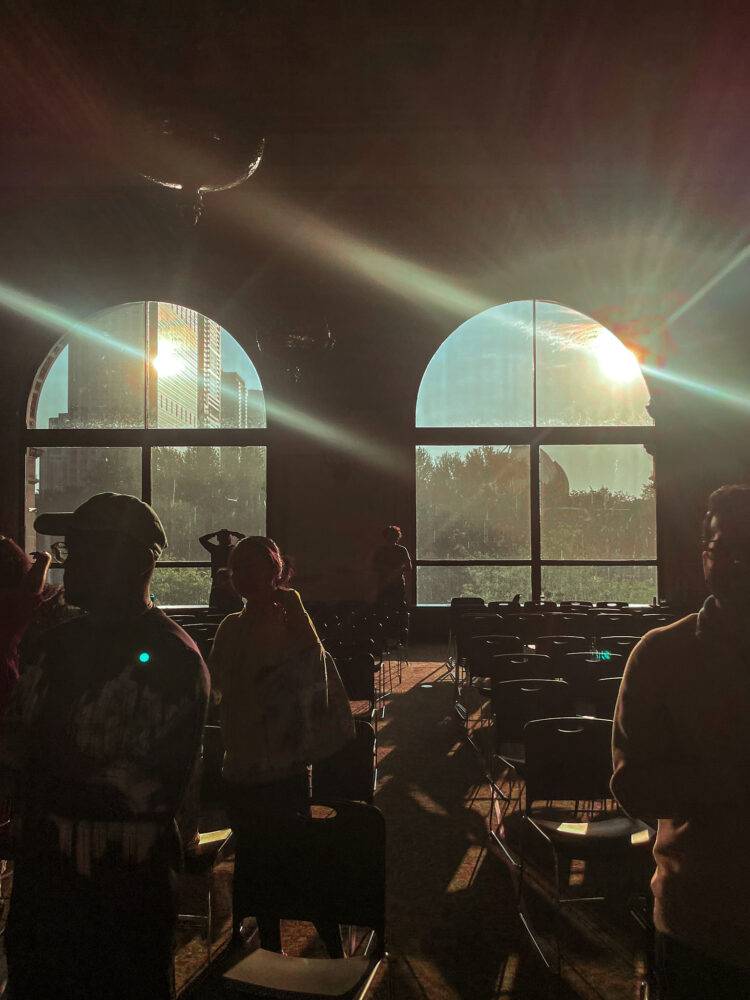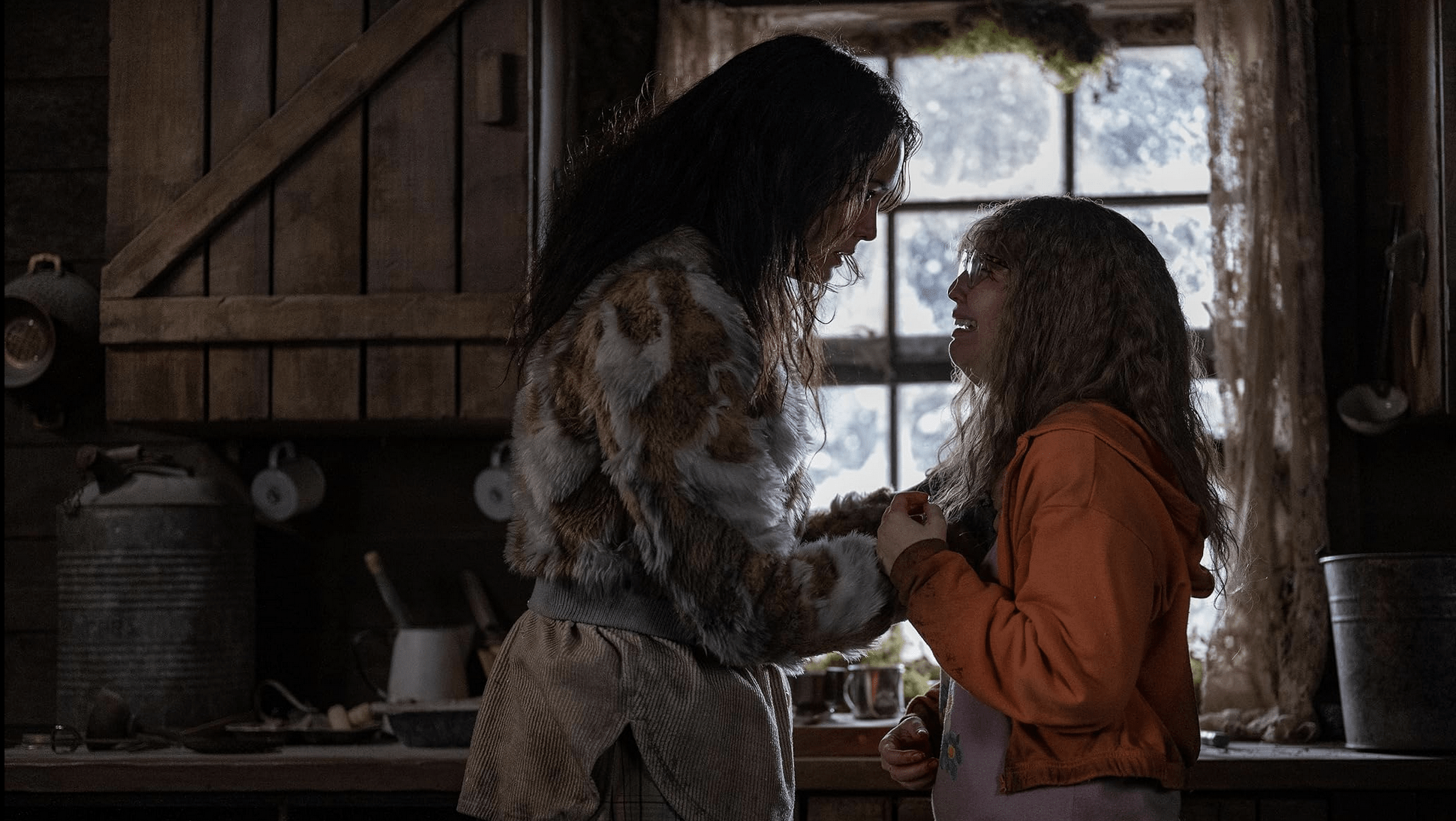I was in Karachi; it was mid-July when Zara, my friend from high school, and now roommate, messaged me about Ragamala, this event she had signed us up for. She was already in withdrawal, pulled away from home, and ready to grab any association to Karachi that came her way. The event was scheduled for the night between Sept. 29 and 30, and I was a long way away. I remember faking enthusiasm.
By Aug. 10 I was living temporarily at my cousin’s place in Chicago. She’s a lover of all things musical, and so I extended the invitation to her and her husband. Looking back, I imagine I was searching for anchors to home as I prepared myself to witness something that had always been shared and dispersed.
As the weeks drew close, I found myself bringing it up every chance I could. ‘‘Oh, there’s this really cool South Asian Musical Festival happening overnight next weekend, here, I’ll email you the link. You should definitely come!’’ I would tell the class I TA for and slide it into conversation with Leila at the writing center.
On the day of the event, Khytul (a South Asian friend) and I had a class together, and we ended up talking to people in the class about it as well. A last-ditch effort to congregate as many familiar faces for the event.
I was late getting home that day and bone tired on top of that. I knew I’d miss the start of the performances either way they were supposed to start at 6, so I took a nap, falling asleep with my make-up still on and the duvet under me instead of covering me up.
I woke up thinking I was being called. Zara was home, but she was asleep. I sat for a few minutes wondering who or what was doing the calling. It would be easy to describe the way I was feeling as urgency, It was akin to the feeling I had on Sunday mornings knowing my parents were sitting downstairs at the breakfast table waiting for me to come so we could start.
Zara and I were supposed to leave together, but I couldn’t resist the pull anymore. I dressed myself in the same outfit I’d worn to class; a green skirt, and a black turtleneck, and I was out of the house within a few minutes.
My skin was pulled tight throughout the 16 minutes in the Blue Line, and finally, I made the 7-minute walk to the Culture Center as my blood was vibrating.
I walked into a Carnatic performance at 9:30. There was a vocalist (Ramakrishnan Murthy), a violinist (Charu Mathi Raghuraman), and a mridangam player (NC Bharadwaj). I’ve played a little bit of sitar, tabla, and violin, and witnessed enough exceptional players, so it took only a few seconds of observing to know that these performers were prodigies.
Looking at the list of performances, I realized too late that the sitar performance, the one that had initially drawn me in, was already over. I was devastated. My skin was quieting down, my body less reactive to the music, and a small, tinny, voice in my head was already mourning the loss of my duvet.
A few seconds of coordination revealed that my cousin was already there, and coincidentally, the seat in front of her was free. I was sliding in before I knew it and settled down, prepared to surrender myself to the music.
Interruptions were immediate and many, and the biggest hindrance to my immersion was me.
My thoughts were overwhelming: I wondered who was playing next. Let me look it up. Did I remember to keep water? Is the coffee in my thermos going to be enough to keep me going through the night? I’ll shake it and check. Is Zara on the way? Okay her live location shows that she is. Did Ankit message yet? Oh, Khytul texted. I wonder if that’s Amruta in the second row.
The set ended in a haze of tabla beats and the light of my phone.
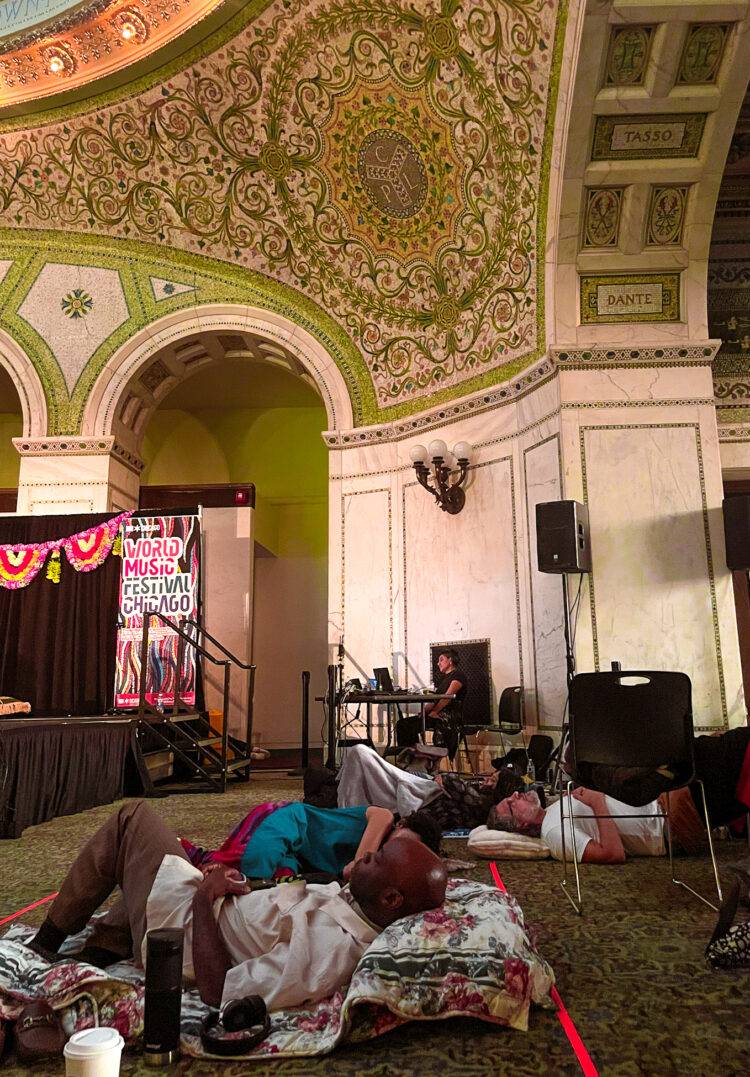
The break between the performances came at 10:45. Zara was there and so were my cousins, so naturally what followed was a round of introductions. I was feeling unmoored in the sea of people; some brown, some Black, some white. Some Desis, Arabs, some familiar, and the rest foreign, but all still drawn here by the same notes. Zara was in Desi clothes, a South Asian beacon, and I was there in all my turtleneck glory. There was nothing identifying me as one with the music.
When the time came to seat ourselves, I gravitated towards the floor. There was a small section where a carpet was laid out amidst the rows of chairs. The thin strip had been fully occupied in the last set. There were gaps now, and Zara and I were quick to lay claim. There were blankets, throws, duvets, and sleeping bags laid out. Someone was already curled up and asleep in one. Other people were preparing to slumber. This was what they called equipment, something they had prepped because this was a regular event for them.
I felt like an outsider again.
There were a couple of guys sitting a few feet away from us. They kept glancing over, smiling a bit. One of them was in a red shirt, and I’d catch him looking every few seconds. A moment later Zara leaned back into my neck, whispering close to my ear about the guy in the red sweater. I wasn’t surprised she had noticed, he was being a little too obvious.
The first strum of the next act interrupted our conversation. I knew the raga, and my throat closed onto my words; stifling them, stealing my breath. I leaned into Zara’s shoulder, tethering myself to her body, letting her become my anchor and choosing weightlessness as the music flowed.

By 1 a.m., half the people had left. It was still full, but people had a place to sit. When I coiled my neck back, I could actually see the pillars and the staircases, instead of a throng of people bewitched by the lulls of this music.
I was surprised at the amount of people who had managed to extricate themselves from this.
South Asian classical music, in its nature, is inherently interactive. It’s never a solo act; even when there are no vocals, the audience has a voice. People hum and clap, some of them identify the beat and bring their hands together along with the tabla, and some fall behind, not able to align with the thrum, but becoming part of the echo. Both mix and who knows where the first taal ends and the next one begins. The teal-blue dome above us was our chamber, and we were just slaves to the notes floating in the air.
When there are no words offered in the music, you fill in the blanks. And my spaces were filled with love.
The six ragas in Carnatic music were between me and my people.
They were between my mom and me, her heartbeat because we don’t speak in words.
It was between me and God. An exchange of gratitude, love, pain, hate, pleading, forgiveness, hate, love, and searching. Where is my God? I found him in the spaces between Kalyani and Bihag (two ragas).
It’s between me and my lover. The said and the unsaid.
It’s between me and myself. My body whose language I speak but never bother answering. It spoke to me in the blanks and I responded.

This music invited me to the floor where my body had more agency to respond. My legs folded in front of me, aalti paalti, as we call it back home. My feet touched the ground and the staccato, the vibrations, the ache of the palm as it hit the tabla, reverberated through me.
I think about how much I enjoy watching videos of these performances; how the camera is never stationary no matter how firmly the wielder wills it. The movement is pulled from the listener like a snake responding to the tune of their master. The performer was our commander, and I was in a sea of swaying snakes caught in a serendipitous sequence.
There were breaks between every set; if I was there just for the music, I’d say that regretfully. But I was there for the immersion, and the half-hour periods in between welcomed more experiences than I thought could fit in one night.
One of my breaks was spent receiving the news of my sister’s engagement back home. The conversation was angry and jazbati (passionate). It was an announcement that took me by surprise, and I spent those thirty minutes sitting on the steps of one of the staircases, AirPods in my ears, whisper-yelling at my mother. Red-shirt guy finally made his way to me. I mimed that I was talking on the phone
He left.
I later found out that he didn’t actually get what I was saying, he didn’t see the AirPods in my ears, and he just thought I was a crazy person, telling him to go away in a language he couldn’t comprehend.
The second break was spent making an impromptu trip to 7/11. We were low on caffeine, out of cigarettes, and desperate for a bite to eat. It was hard to walk away knowing we might miss part of the next act but the possibility of community wore me down. Or perhaps it was peer pressure. We’ll never know.
By the next act, the red-shirt guy had gravitated towards me. His name was Ravi, and after some quick introductions, he came down with us for the next break. The first ten minutes were spent with Zara teaching us how to bum cigarettes off of people, but when we broke off into pairs, I ended up talking to him. Ravi knew what to say, and how to say it, and he had an equal appreciation of South Asian Classical Music and Bollywood. I was sold. He was 35 years old; I thought it best to not act on the whims of 5 a.m. sleep-deprived Marium.
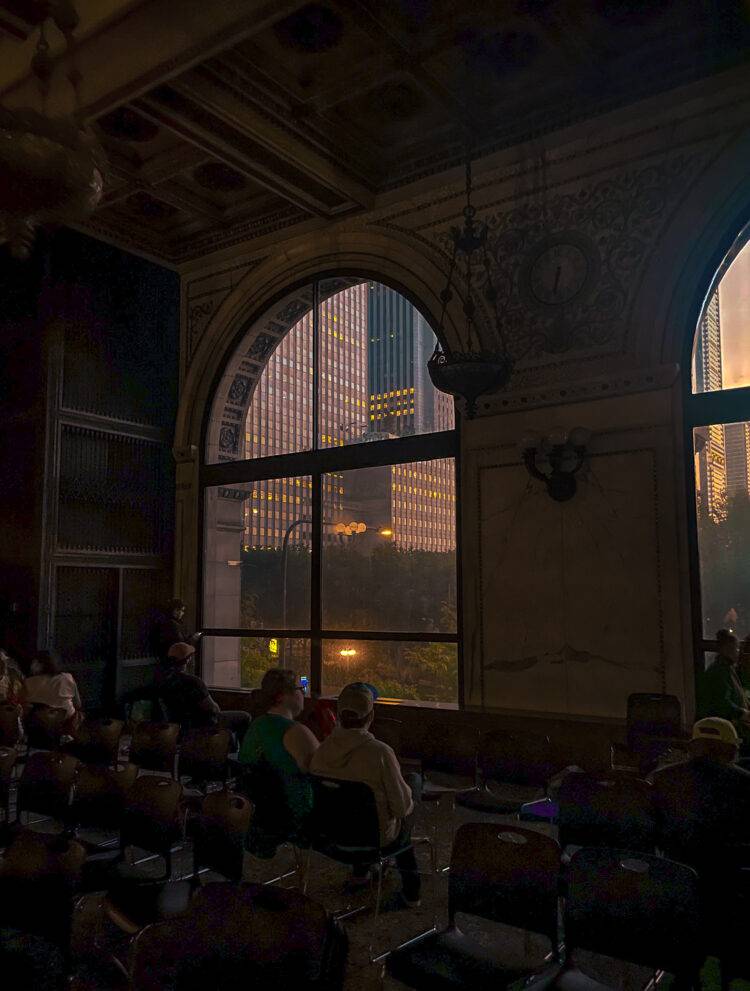
We walked upstairs for the last performance. The sun was peeking through the tinted windows, and I was still riding the ways of euphoria after witnessing Saraswathi Ranganathan‘s veena performance. It was 7 a.m. and only a handful of us were left, some muddled throughout the seats, the others on the floor. Zara was lying down amongst the sea of strewn bodies, her eyes closed. I had taken a shawl from Tushant and had my legs curled under them, so conscious of my skirt in Desi presence. The closing performance was the bansuri by Lyon Leifer, and he was accompanied by Hindole Majumdar, who was playing the tabla. We settled in for the final stretch.
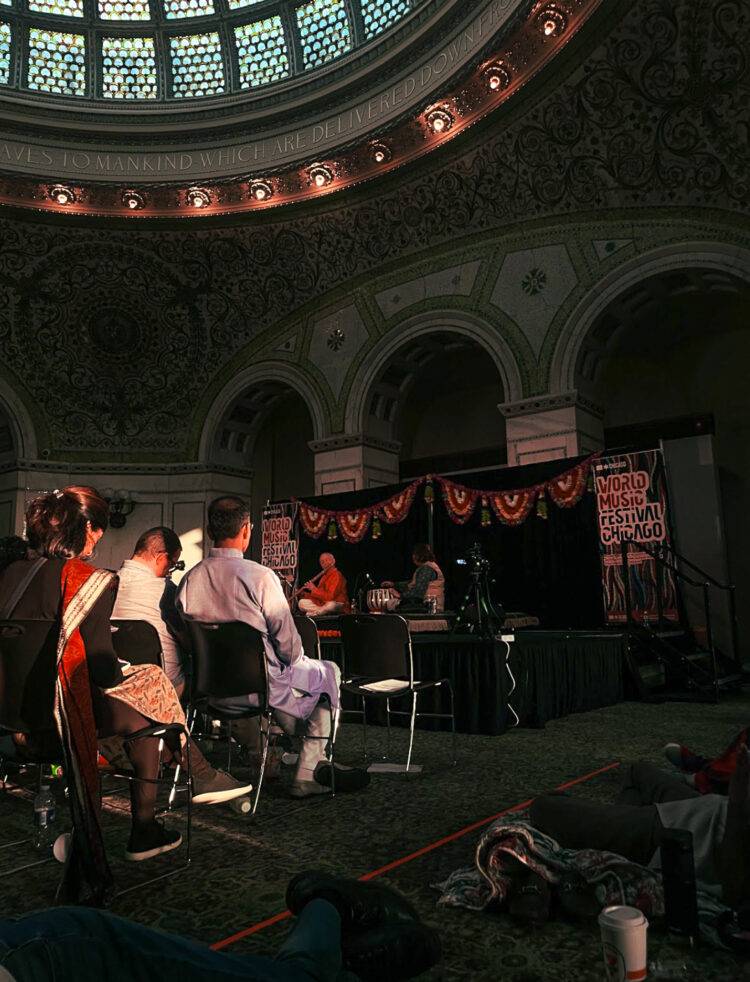
A moment of thousands of infinities, half stolen from the iconic line in “Perks of Being a Wallflower,” is what I scribbled onto my hand with the pen I’d stolen from Tushant when the bansuri became the backdrop as the sun finally streamed into the room.
I wish I could say how captivated I was by the end of it. But this performance was complimenting the slow rise of the sunrise, and the building lull of music was a lullaby in my ears. People were dropping around me, some had their heads lolling, while others had given in and taken space on the carpet. Only a few of us were left to witness how the sun made its way to the stage, and lit it up, as the final notes of the bansuri rang out.
